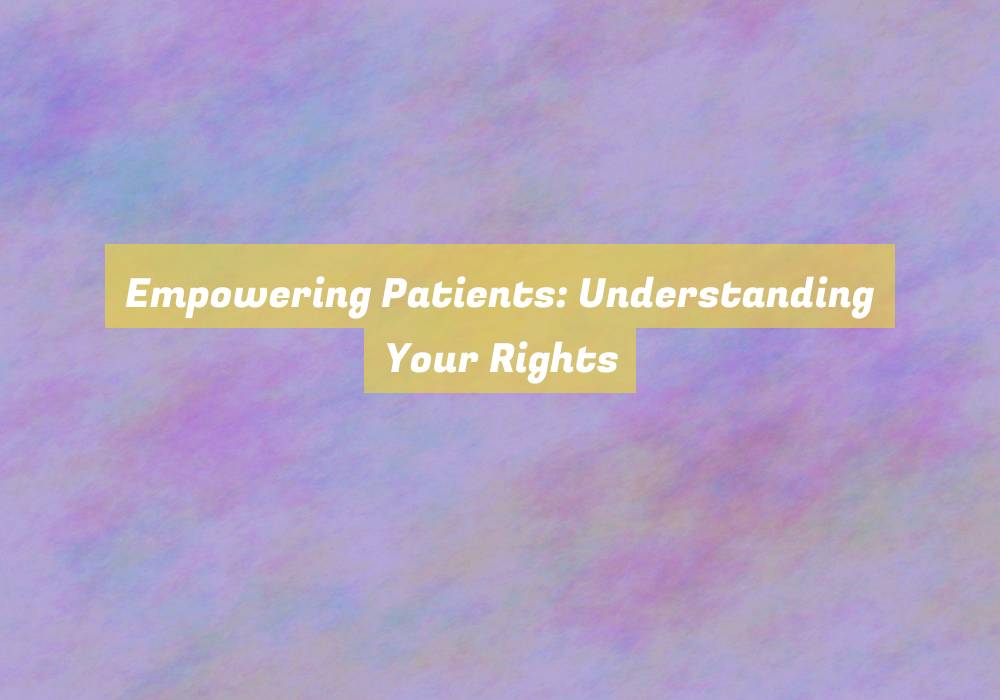Empowering Patients: Understanding Your Rights
You hold the key to your own healthcare, but do you know how to use it? Understanding your rights as a patient is like having a map to navigate the complex terrain of the healthcare system.
ItG??s not just about knowing what youG??re entitled to, but also about how to advocate for yourself when it comes to your medical care.
As you navigate through the maze of healthcare, itG??s essential to be equipped with the knowledge and tools to ensure that your voice is heard and your rights are respected.
But what exactly are these rights, and how can they empower you in your healthcare journey?
Patient Rights and Responsibilities
As a patient, you have both rights and responsibilities when receiving medical care.
ItG??s crucial to understand that you have the right to receive respectful and considerate care, regardless of your race, ethnicity, gender, age, or medical condition. You have the right to be fully informed about your medical condition, treatment options, and potential risks involved. ItG??s also your right to participate in decisions about your healthcare, including the right to refuse treatment.
However, along with these rights come responsibilities. YouG??re responsible for providing accurate and complete information about your medical history and current health status. ItG??s important to follow the treatment plan and medical advice provided by your healthcare providers to the best of your ability.
Additionally, respecting the medical staff and other patients, as well as following the healthcare facilityG??s rules and regulations, are also your responsibilities as a patient.
Understanding and embracing these rights and responsibilities can contribute to a more effective and respectful healthcare experience for both you and the medical professionals caring for you.
Access to Medical Records
You can request access to your medical records from your healthcare provider. As a patient, itG??s important to be able to review your medical history and ensure that all the information is accurate. Access to your medical records allows you to stay informed about your health and actively participate in your healthcare decisions.
In the United States, the Health Insurance Portability and Accountability Act (HIPAA) gives you the right to obtain copies of your medical records. You may need to fill out a form or submit a written request to your healthcare providerG??s office. TheyG??re required to provide you with a copy of your records within a reasonable timeframe, usually within 30 days.
Your medical records contain important information such as your medical history, test results, medications, treatment plans, and any allergies or adverse reactions you may have had. By having access to this information, you can better understand your health conditions and treatments, and also share this information with other healthcare providers if needed.
Being able to access your medical records empowers you to take control of your health and make well-informed decisions about your care.
Informed Consent and Decision-Making
When making medical decisions, itG??s crucial to understand the concept of informed consent and the role it plays in your healthcare. Informed consent is more than just signing a form; itG??s a process that involves understanding the proposed treatment or procedure, the risks and benefits, and any alternative options.
As a patient, you have the right to be fully informed about your medical care so that you can actively participate in decision-making. Your healthcare provider should explain the recommended treatment, including its purpose, potential risks, and expected benefits. They should also discuss any alternative treatments or the option of not receiving treatment at all.
ItG??s essential to ask questions if thereG??s something you donG??t understand or if you need more information. Your provider should respect your autonomy and support your right to make decisions based on your values and preferences. Remember that informed consent is an ongoing process, and you have the right to change your mind at any time.
Your active involvement in the decision-making process can lead to better outcomes and a more satisfying healthcare experience.
Seeking Second Opinions
Considering seeking a second opinion is a proactive approach to ensuring you receive comprehensive and informed healthcare decisions. When facing a significant medical diagnosis or treatment plan, itG??s natural to have doubts or questions. Seeking a second opinion can provide you with additional insights, alternative treatment options, and reassurance about the recommended course of action.
ItG??s essential to remember that seeking a second opinion doesnG??t imply a lack of trust in your current healthcare provider; rather, itG??s about taking control of your health and making well-informed decisions.
Before seeking a second opinion, inform your current healthcare provider about your decision. They can provide you with relevant medical records and may even recommend specialists for your second opinion. Research potential healthcare providers who specialize in the specific condition or treatment youG??re seeking guidance on.
Once youG??ve obtained the second opinion, compare the recommendations and treatment options provided by both healthcare providers. This can help you make the best decision for your health, peace of mind, and overall well-being.
Ultimately, seeking a second opinion empowers you as a patient and ensures that you have explored all available options before making important healthcare decisions.
Conclusion
In conclusion, understanding your rights as a patient is essential for taking control of your healthcare. By knowing your rights and responsibilities, accessing your medical records, giving informed consent, and seeking second opinions, you can empower yourself to make informed decisions about your health.
Remember, you have the right to be fully informed and involved in your own care, so donG??t be afraid to speak up and advocate for yourself.







